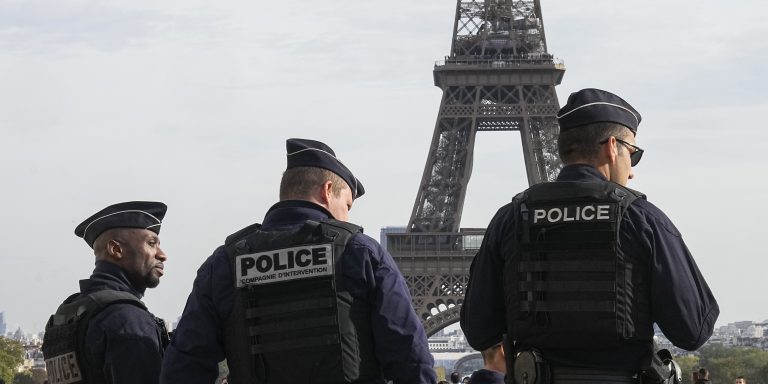INTELBRIEF
March 28, 2024
IntelBrief: The War in Gaza Reverberates in Europe as France Grapples with the Fallout

Bottom Line Up Front:
- The spillage of the Middle East conflict into France has led to a noticeable surge in antisemitic and Islamophobic incidents, as well as threats of terrorist activities, particularly concerning the upcoming Olympic Games in Paris.
- In the past week alone, reportedly, around 50 schools received menacing messages on their digital communication platform announcing an upcoming terrorist attack at their schools from an alleged Islamic State member.
- A spike in antisemitic incidents has prompted widespread concern, with a majority of French citizens viewing these acts not just as a threat to individuals of the Jewish faith but also to society as a whole.
- France’s Republican values, notably laïcité, have made educational establishments and teachers a prime target for terrorists.
The repercussions of the Hamas-Israel conflict persist worldwide, exerting significant influence on the political and security dynamics beyond the Middle East. In the aftermath of October 7, there has been a noticeable surge in both antisemitic and Islamophobic incidents in France, coupled with increased threats of Islamist terrorist activities. This is particularly concerning with the upcoming summer Olympic Games in Paris, set to host more than 15.3 million visitors worldwide. The escalating number of terrorist threats aimed at educational institutions, along with a rise in thwarted terror plots across the nation, underscores the urgency for both heightened and effective security measures and has led to a renewed emphasis on upholding laïcité. These factors collectively underscore the wide-ranging domestic consequences of the Middle East conflict. On Monday, French President Emmanuel Macron stated that the Islamic State affiliate group Islamic State-Khorasan (IS-K), which has been linked to the deadly Moscow Crocus City Hall attack, has attempted several attacks on French soil, further highlighting the complex national security landscape of France.
Only days after Hamas’ 7 October attack on Israel, a Chechen man, surveilled by the French security services on suspicion of Islamic radicalization, killed a teacher at his former high school in Arras. Two months later, a radicalized Iranian French man who wanted to “avenge Muslims” killed a tourist near the Eiffel Tower and injured two. Since then, educational establishments have received more than 800 bomb threats, and numerous terrorist attacks have been thwarted across the country. Now, in the aftermath of the devastating attack at Moscow's Crocus City Hall, France has moved to deploy an extra 4,000 troops for nationwide patrol and elevated the Vigipirate national security alert system to its highest level. In the past week alone, numerous schools in France received bomb threats and around 50 schools received menacing messages on their digital communication platform announcing an upcoming terrorist attack at their schools from an alleged Islamic State member. French criminology professor Alain Bauer on France 5 noted a resurgence in terrorist attacks plotted by small cells (3-4 people) rather than lone wolves. He notes that there have never been so many adolescents arrested by the intelligence services on charges of actively preparing an attack, with more than half of those arrested previously unknown to the services for radicalization. These figures shed light on the growing trend of new radicalization in French society following the Hamas-Israel conflict, particularly highlighting the susceptibility of young people.
After the October 7 attacks by Hamas and the burgeoning humanitarian catastrophe in the Gaza Strip, both antisemitism and islamophobia have surged in France. The country has significant Jewish and Muslim communities. A nearly fourfold increase in antisemitic acts was reported in 2023 compared to the previous year. Additionally, on October 7, incidents of antisemitic acts surged by over 700 percent compared to the daily average observed in previous years. Antisemitic acts have included vandalism such as painting Stars of David on Jewish homes, physical assaults like the attack on a Jewish woman in Lyon, and other forms of intimidation. The spike in antisemitic incidents has prompted widespread concern, with a majority of French citizens viewing these acts not just as a threat to individuals of the Jewish faith but also to society as a whole. Despite policy responses such as increased security measures at Jewish places of worship and heightened terror threat alerts, the persistence of antisemitism underscores deep-seated societal tensions that continue to pose challenges for France. Parallel to the rise in antisemitism, there has been an increase in Islamophobic incidents in France. The French Muslim Council said it had received 42 threatening letters in October. Additionally, the Interior Ministry's Statistics Service reported a 32 percent increase in racist, xenophobic, and religion-based hate crimes in 2023, though it did not provide data on the victims’ religion.
The spillover effects of the Hamas-Israel conflict and the resurgence of Islamist Jihadism in Europe interact peculiarly with France’s secular and republican tradition and identity. Laïcité, the constitutional principle of secularism in France that ensures religious neutrality in public affairs, has led to divergent reactions in France to the rise in insecurity. For example, with the murder of yet another teacher, many consider the terror threat and the education system’s foundational Republican values deeply intertwined. Teachers have long been viewed as “the first line of defense” of laïcité which also increasingly has made them easy targets for radicalized individuals. Adjacently, pro-Palestinian protests are unpopular with the French public, with roughly 72 percent against such demonstrations and some considering them fundamentally anti-Republican or antisemitic. The conflict has thus exposed and deepened political and social divisions within France on its core values. In politics, the debate over the conflict and its repercussions on France is also highly polarized, with some political figures refusing to label Hamas as a terrorist organization, such as Mathilde Panot, while others, particularly from the far-right Rassemblement National, have sought to leverage the conflict to distance themselves from accusations of antisemitism. With the upcoming European Parliament elections in June and the Olympics starting in July, security will remain at the top of French voters' minds.